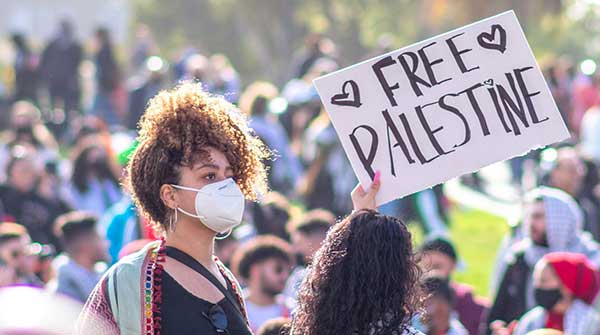Hamas-Israel war continues to fuel conflict in the Middle East and has sparked antisemitic protests worldwide

For interview requests, click here
There have been events in world history that have left a permanent mark on our minds and memories. Some have been good, some have been bad – and a certain few have caused an awful stain that could potentially last for years, decades or centuries.
What happened on Oct. 7, 2023, has become part of that small, unfortunate category.
One year ago, the terrorist organization Hamas led a massive attack against Israel. An estimated 1,139 people were killed, which included Israeli civilians and security forces members. Hamas abducted a total of 251 hostages, of which 97 – including 33 confirmed dead by the Israel Defence Forces – remain in Gaza.
Israel and Hamas are still at war one year later. The situation has escalated due to the intervention of another terrorist organization, Hezbollah, and, more recently, the totalitarian regime in Iran. While Israel’s military is more than capable of withstanding the attacks of their enemies, the situation has made the Middle East far more volatile than it has been in recent years.
 Photo by Patrick Perkins |
| Recommended |
| Time to talk about the racism against Arabs
|
| Greta Thunberg’s newest honour: “Antisemite of the Week”
|
| Why left-wing activists get the Hamas-Israel war all wrong
|
There have been numerous protests around the world in response to the Israel-Hamas war. The vast majority of these demonstrations have been pro-Palestinian, though pro-Israel rallies have also taken place in Canada, the U.S., and other countries. The irony is that these pro-Palestinian protests were triggered by the violent actions of Hamas, a bloodthirsty terrorist group responsible for killing hundreds of innocent people. If Hamas’s attack on Israel had not occurred, these marches would not have filled our streets and communities over the past year. While many protestors claim their participation does not equate to support for Hamas, the connection is impossible to ignore.
Encampments have been set up on university campuses both domestically and internationally. Anti-Jewish, anti-Israel, and anti-Semitic slogans have been prevalent throughout these demonstrations. The phrase “from the river to the sea” has become a rallying cry for many involved in these illegal occupations of university property. As a result, many students, both Jewish and non-Jewish, have experienced a range of emotions, including anger, frustration, intimidation, and fear.
There’s more. Jewish schools and synagogues have been targeted and attacked. Protests have occurred outside several Jewish-owned restaurants like Toronto’s Cafe Landwer, as well as non-Jewish businesses like Zara, a retail clothing chain which was perceived to be aligned with Israel. A pipe bomb exploded near the Israeli embassy in Nicosia, Cyprus. South Africa initiated an ongoing genocide case against Israel to the International Court of Justice. There have even been instances of shootings and stabbings of pro-Palestinian demonstrators on a couple of American university campuses.
It’s not like I’m telling you something you don’t already know. Unless you’ve been living under a rock this past year, you’ve witnessed these events unfold right before your eyes.
I haven’t been personally affected by the Israel-Hamas war. I was born Jewish but left the faith more than 40 years ago and regard myself as agnostic. At the same time, I, like many others, feel terrible for those who have directly suffered in some fashion – or have family members and friends who have experienced everything from discomfort to hatred.
Some people have broken ties with longtime friends due to conflicting political and personal views about the war. Some neighbours have stopped speaking to each other in this prickly environment. Some people have lost their jobs by taking controversial stances in public. Some groups have ended their associations with Israel and other perceived allies, and the chances of these relationships being rebuilt are slim to none.
Meanwhile, some people have lost faith in their countries due to the uptick in racism and intolerance. They’re also furious at their governments’ inaction in quelling these controversial individuals, groups and positions.
Here’s a stark example. A feature piece by the National Post’s Adrian Humphreys and Ari Bluff focused on 12 members of Canada’s Jewish community and their feelings about the increased levels of antisemitism. “Most are anxious, many are fearful,” they wrote in the Oct. 5 special investigation, while “some have moved – to news schools, new cities, and even fled Canada altogether.” This viewpoint is clearly not representative of the average Canadian Jew. However, it raises the question of whether some members within this religious community are beginning to reach what the article calls a potential “tipping point.”
The Israel-Hamas war, like most conflicts, will end. When it does, what happens next?
Can the tense relations between Jewish, Arab, and Muslim communities ever improve, or will they continue to deteriorate? Can pro-Israel and pro-Palestine supporters ever reach a point where they agree to disagree about the Middle East in a respectful, civilized way? Can our society regain the progress it has lost after falling so far back in just one year?
The answers to these questions remain uncertain – much like the future of our world.
Michael Taube is a political commentator, Troy Media syndicated columnist and former speechwriter for Prime Minister Stephen Harper. He holds a master’s degree in comparative politics from the London School of Economics, lending academic rigour to his political insights.
Explore more on Islamic fundamentalism, Antisemitism, Terrorism
The opinions expressed by our columnists and contributors are theirs alone and do not inherently or expressly reflect the views of our publication.
Troy Media
Troy Media is an editorial content provider to media outlets and its own hosted community news outlets across Canada.
